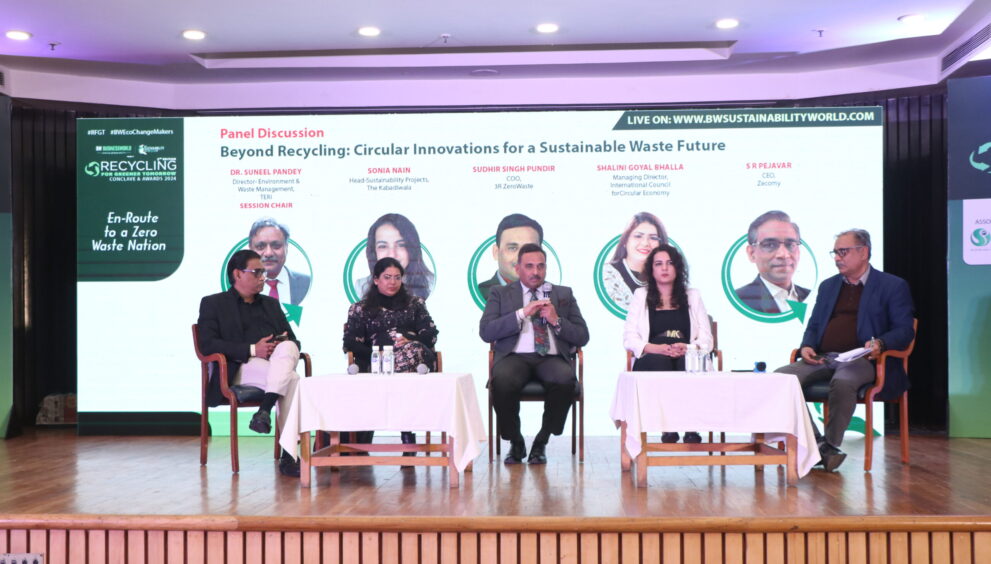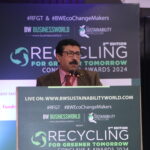Beyond Waste: Unveiling Circular Innovations in Sustainability

An exclusive event organised by BW Businessworld with prominent industry speakers held in Delhi outlined the innovations of sustainability in building a greener planet.
Dr Suneel Pandey, Director-Environment & Waste Management, TERI, commenced the discussion and delved into the concept of the circular economy, a paradigm focused on eliminating waste through strategic design. This encompasses material recovery, recycling, product design, and packaging reduction, all aimed at resource efficiency without compromising quality output. He connected this initiative with the Sustainable Development Goals (SDGs), particularly SDG 12 on sustainable consumption and production, which underscores the broader impact.
Sonia Nain, Head of Sustainability Projects, The Kabadiwala, facilitated the discussion on circularity and introduced The Kabadiwala, which has been operational in five Indian cities since 2014, offering a unique approach to waste management. The app, with over 50 categories, encourages users to schedule free pickups for items, emphasising the environmental impact post-transaction.
Nain focused on ensuring traceability and transparency and employed a segregation facility and application-based notifications throughout the value chain of the app. The platform actively contributes to circularity awareness, as evident in its recent Direct Return System (DRS) campaign.
Despite the global decline in circularity rates, Nain talked about being committed to reversing this trend through innovative campaigns and advocated for brands to display circularity data prominently on packaging, fostering increased awareness and engagement.
Nain emphasised the need for public-private partnerships for a unified circularity goal. Highlighting the tech gap among waste pickers, she stresses the importance of scalable, affordable technology.
Sudhir Singh Pundir, COO of 3R Zero Waste, revolved around waste reduction, emphasising the need to close the loop on items they use. He underscored that understanding the future of the products we consume is crucial. He pointed out an approach involving awareness, reuse, and recycling, with a strong emphasis on value addition through upcycling.
Drawing inspiration from past endeavours like Mr Nek Chand’s rock garden, he strives to make upcycling a common practice and has initiated projects like crafting decorative pieces from waste and promoting upcycling through workshops. ‘The goal is to transform the perception of waste into a valuable resource,’ he added.
Highlighting the contrast between corporate buying protocols and personal purchases. Pundir stressed the importance of mindful buying and planning purchases like shoes or cars. ‘The key takeaway is fostering a feeling of gratitude towards possessions and emphasising the reciprocal relationship between service and care,’ he added.
Shalini Goyal Bhalla, Managing Director, International Council for Circular Economy, represented a focus on circular economy and emphasised the shift from downstream to upstream discussions. Bhalla highlighted the importance of moving from recycling to designing in the circular economy.
Bhalla introduced a three-fold mantra for the industry: modularity, assessment, and design (MAD). Modularity involves breaking down production into modules to enhance flexibility and sustainability. Assessment stresses the importance of lifecycle assessments and data analytics to inform sustainable decision-making. Lastly, design highlights the necessity of integrating sustainability considerations at the design phase to foster overall production cycle sustainability.
Bhalla advocated the importance of data collection, leadership commitment, consumer awareness and understanding, and the inclusion of green jobs in the circular economy for a holistic approach to sustainability.
With a three-decade background, S. R. Pejavar, CEO of Zecomy, reflected on the shift from ESG to a comprehensive environmental approach emphasising respect for all stakeholders, including the planet. He outlined its B2B operations utilising AI and blockchain technology to provide a one-stop solution for transparent, traceable, and compliant waste management.
Pejavar discussed waste mapping, price discovery, and integration into clients’ designs for sustainable practices, promising case studies on industries adopting these principles. He emphasised genuine collaboration in adopting circular practices, moving beyond mere greenwashing.
Pejavar advocated for organisations to pursue zero-waste landfill certifications as an enabler for achieving net zero status. Upstream considerations, particularly the decarbonisation of suppliers. He also talked about regenerative practices, urging organisations to explore waste-to-energy initiatives and a shift towards regenerating resources.





































































































































































































































































































































































































































































































































































































































































































































































































































































































































































































































































































































































































